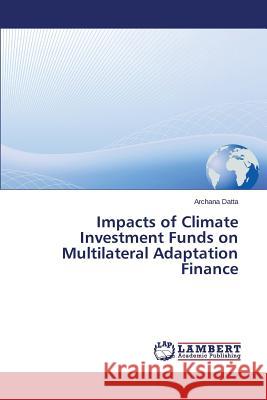Impacts of Climate Investment Funds on Multilateral Adaptation Finance » książka
Impacts of Climate Investment Funds on Multilateral Adaptation Finance
ISBN-13: 9783659485671 / Angielski / Miękka / 2013 / 116 str.
The UN Framework Convention on Climate Change (FCCC) is a global agreement between 194 countries to stabilize greenhouse gas concentration in the atmosphere to avoid dangerous anthropogenic interference with the climate system. Through this Convention, developed countries have also agreed to provide developing countries with funds to both reduce greenhouse gas emissions (mitigate) and build resilience to the current and anticipated changes in average climate conditions (adaptation). While there are several funds administered by a UNFCCC-appointed institute, the World Bank recently launched Climate Investment Funds as an interim mechanism for providing, among other things, adaptation finance in selected developing countries. This book will explore the opportunities and challenges for adaptation financing under the Climate Investment Funds (CIF), as compared to the UNFCCC.
The UN Framework Convention on Climate Change (FCCC) is a global agreement between 194 countries to stabilize greenhouse gas concentration in the atmosphere to avoid dangerous anthropogenic interference with the climate system. Through this Convention, developed countries have also agreed to provide developing countries with funds to both reduce greenhouse gas emissions (mitigate) and build resilience to the current and anticipated changes in average climate conditions (adaptation). While there are several funds administered by a UNFCCC-appointed institute, the World Bank recently launched Climate Investment Funds as an interim mechanism for providing, among other things, adaptation finance in selected developing countries. This book will explore the opportunities and challenges for adaptation financing under the Climate Investment Funds (CIF), as compared to the UNFCCC.











